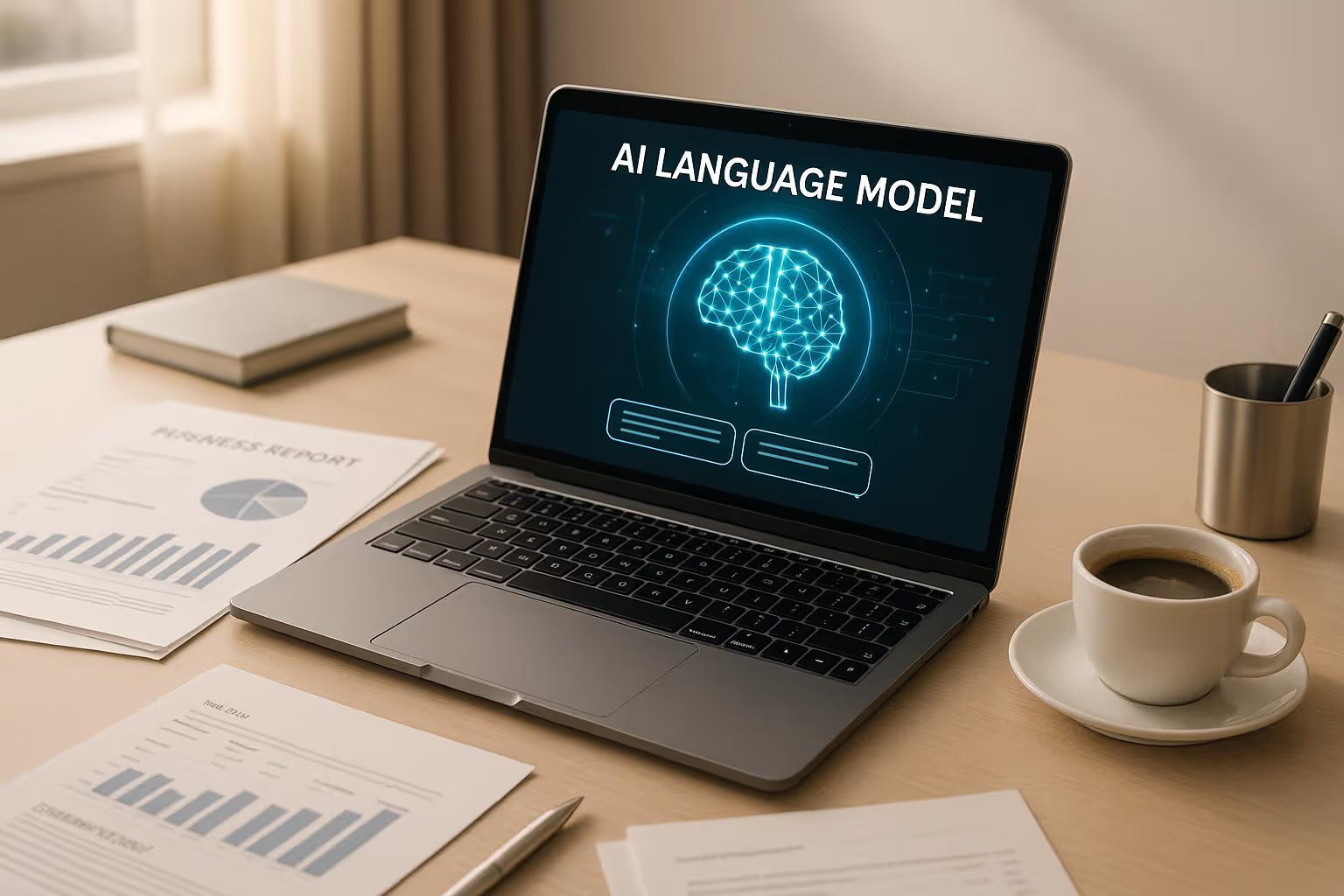
AI language models are transforming businesses by improving productivity, reducing costs, and enhancing workflows. This guide compares five leading options - Prompts.ai, GPT-5, Claude, LLaMA, and Gemini - helping you choose the best fit for your needs.
| Model | Strengths | Limitations |
|---|---|---|
| Prompts.ai | Cost-effective, centralized management | None noted |
| GPT-5 | Advanced reasoning, flexible tiers | Higher costs, single provider |
| Claude | Compliance-focused, reliable outputs | Limited creative flexibility |
| LLaMA | Open-source, customizable | Requires technical expertise |
| Gemini | Multimodal capabilities | Limited data available |
Conclusion: For cost control and centralized AI management, Prompts.ai stands out. GPT-5 excels in advanced tasks, while Claude is best for compliance-focused industries. LLaMA suits teams with technical expertise, and Gemini is worth watching as it matures.
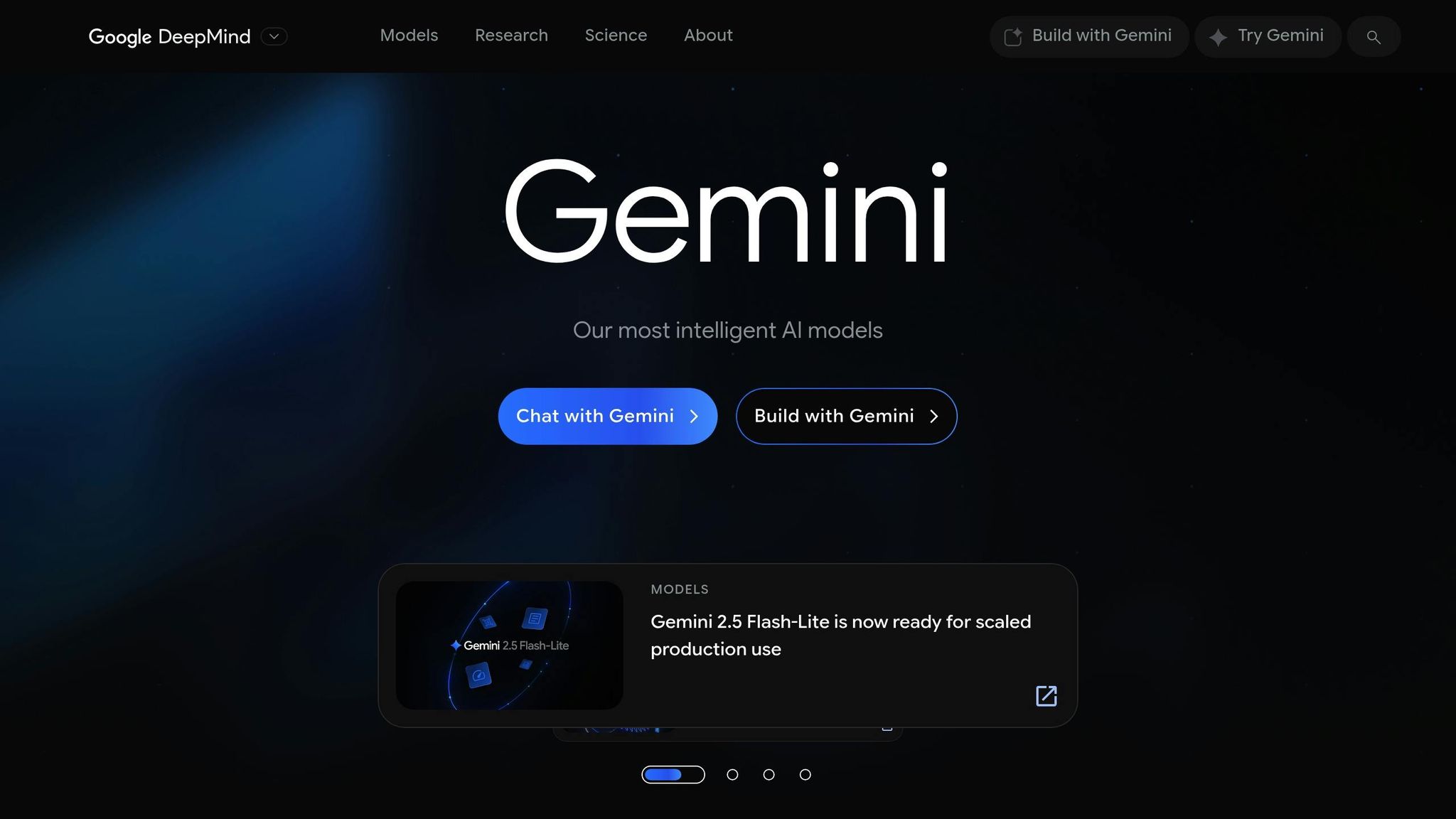
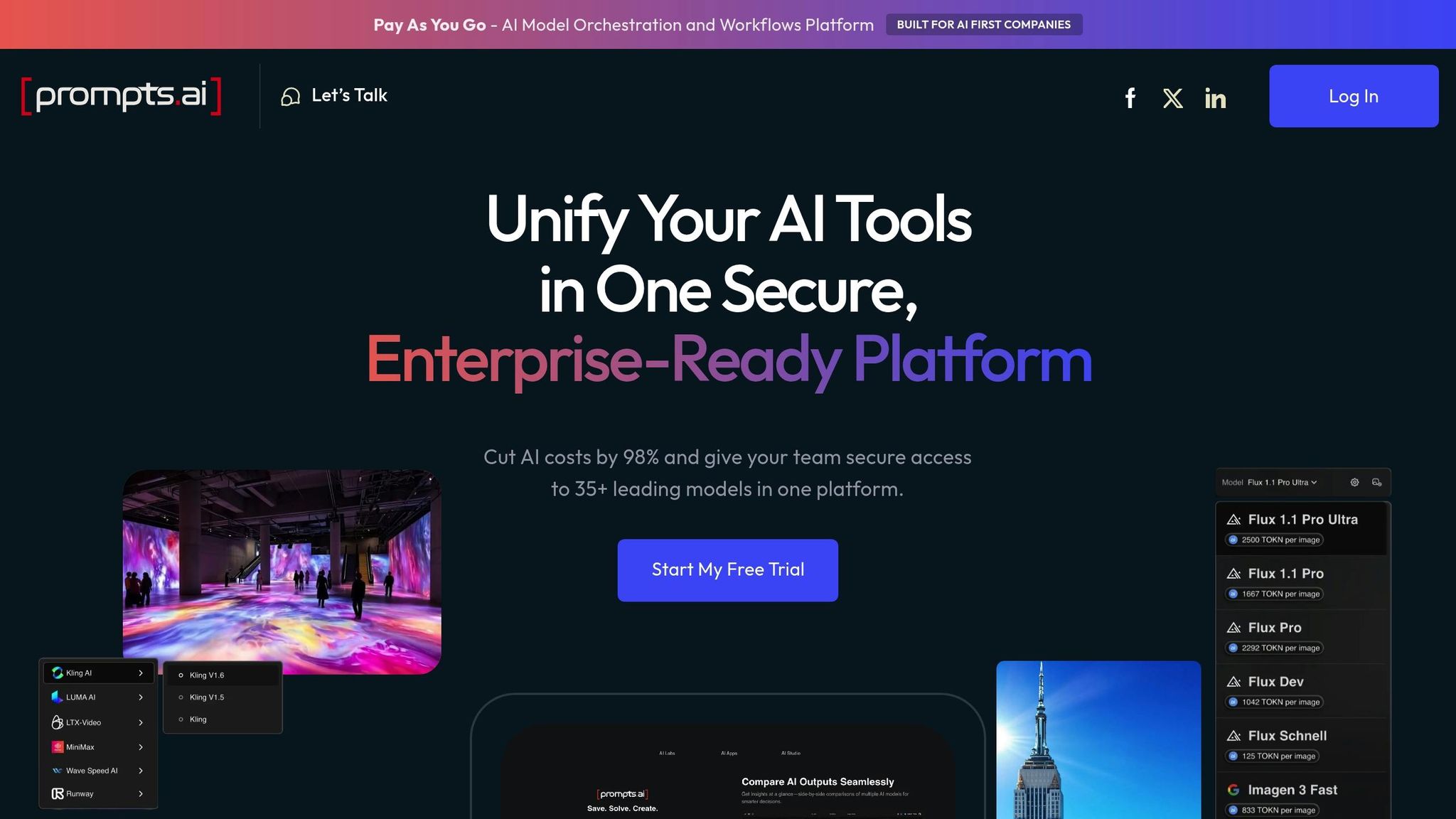
Prompts.ai is a powerful enterprise platform that brings together over 35 leading language models, including GPT-5, Claude, LLaMA, and Gemini, all accessible through a single, secure interface. Instead of juggling multiple AI tools, businesses can streamline their operations by managing everything in one place. This eliminates the chaos of tool sprawl while ensuring strict governance over AI usage.
What makes Prompts.ai stand out is its ability to combine model selection with real-time cost management. Users can compare model performance side-by-side, deploy workflows across teams, and track every interaction transparently. This approach transforms one-off experiments into repeatable workflows that are not only compliant but also safeguard sensitive business data.
Prompts.ai leverages a multi-model strategy to deliver exceptional performance. Businesses can test the same prompt across different models to identify the best fit for each task, ensuring the right tool is used for the job. This adaptability is key to meeting the diverse needs of various business functions.
The platform also provides a library of ready-to-use prompt templates for tasks like drafting emails, generating reports, and automating FAQs. These templates allow teams to customize workflows without needing technical skills, making advanced AI capabilities accessible to everyone, regardless of their expertise.
Security is a cornerstone of Prompts.ai. Every workflow is designed with strict governance in mind, offering comprehensive audit trails to ensure compliance and secure data handling.
Sensitive business information is protected within a secure environment, and centralized governance allows organizations to enforce consistent policies for access control and data management across all integrated models. This unified compliance framework simplifies oversight and reduces the risk of data mishandling.
Prompts.ai’s FinOps layer provides real-time cost tracking, helping businesses save money while maximizing value. By monitoring usage and optimizing model selection based on cost-per-task, organizations can align AI spending with their actual needs. This transparency eliminates hidden costs that often come with managing multiple tools.
The platform’s pay-as-you-go TOKN system ensures businesses only pay for what they use, with no recurring fees. This flexible pricing model can cut costs by up to 98%, making it especially useful for companies with fluctuating AI workloads or those still experimenting with different applications.
Prompts.ai integrates effortlessly with existing systems through APIs and pre-built connectors for tools like CRM, ERP, and collaboration platforms. This seamless integration allows businesses to embed AI into their workflows without disrupting current operations.
Built for growth, the platform enables organizations to scale up quickly, adding models, users, and teams in just minutes without losing performance. As AI adoption expands across departments, centralized governance and cost controls remain intact, ensuring smooth and consistent operations at every stage.
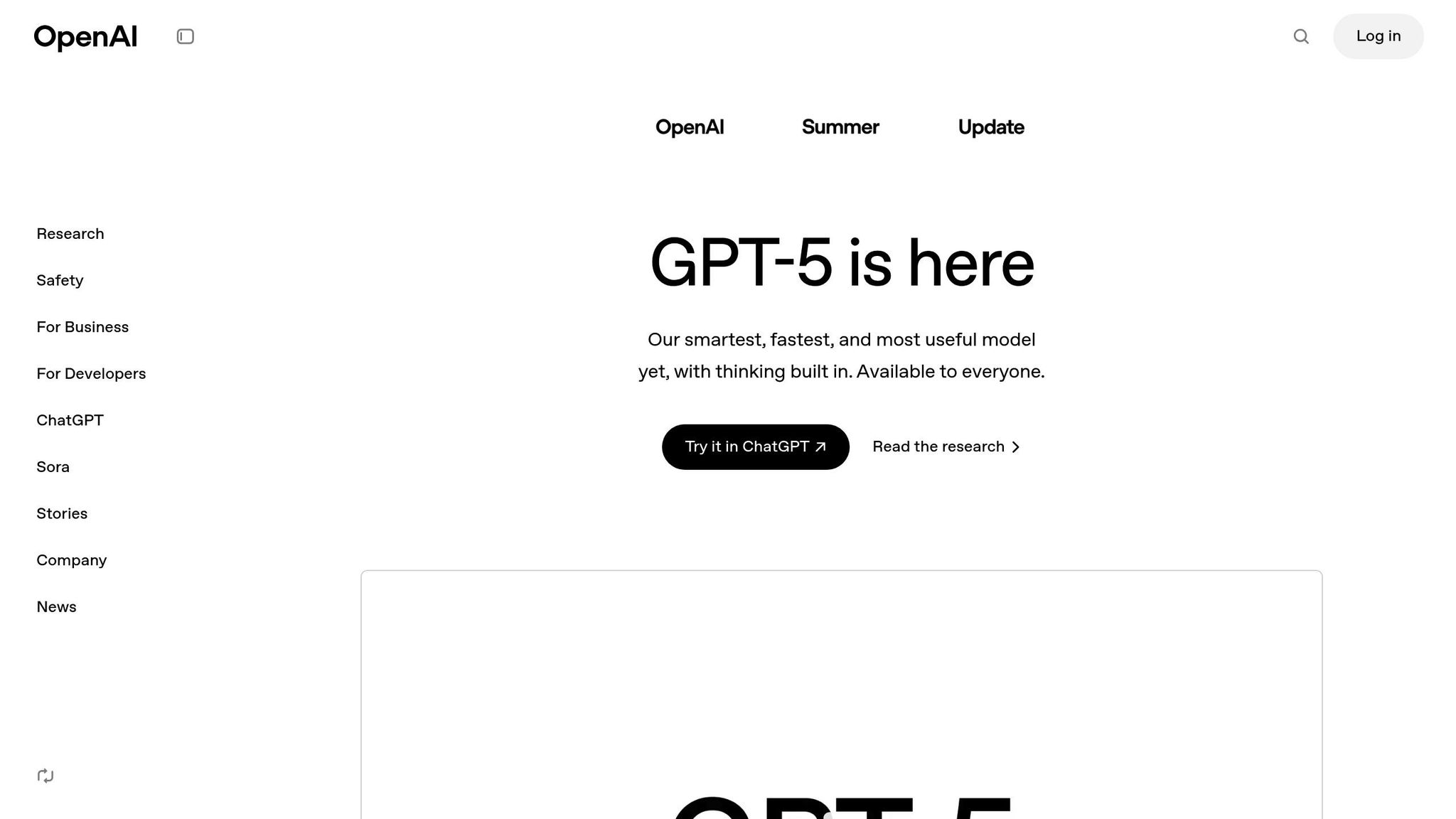
GPT-5 is designed to tackle specific business challenges with tailored features, marking OpenAI's latest step forward in language modeling for enterprise applications. It introduces an intelligent routing system that dynamically selects the appropriate model - prioritizing speed for routine tasks and deeper analysis for more complex needs.
GPT-5 employs a real-time routing mechanism to optimize performance. For straightforward queries or quick content creation, GPT-5 Chat provides fast, efficient responses. When faced with more intricate tasks, such as strategic planning or detailed analysis, the system shifts to GPT-5 Thinking, which is built for deeper reasoning. This dual approach ensures that resources are used effectively, enhancing overall performance while integrating seamlessly into business workflows.
With its tiered structure - GPT-5, GPT-5 mini, and GPT-5 nano - the model accommodates a range of budgets and operational needs. This setup allows businesses to fine-tune their spending by aligning the model's capabilities with the complexity of their tasks. While Prompts.ai integrates multiple models into a cohesive ecosystem, GPT-5 enhances efficiency within its own framework, ensuring computational resources are used wisely.
GPT-5's API is built for smooth integration into existing systems, making it easy to incorporate into current workflows. Its ability to handle diverse workloads ensures businesses can scale operations effortlessly as demand fluctuates. Flexible subscription plans further support businesses by offering tailored options to meet varying requirements.
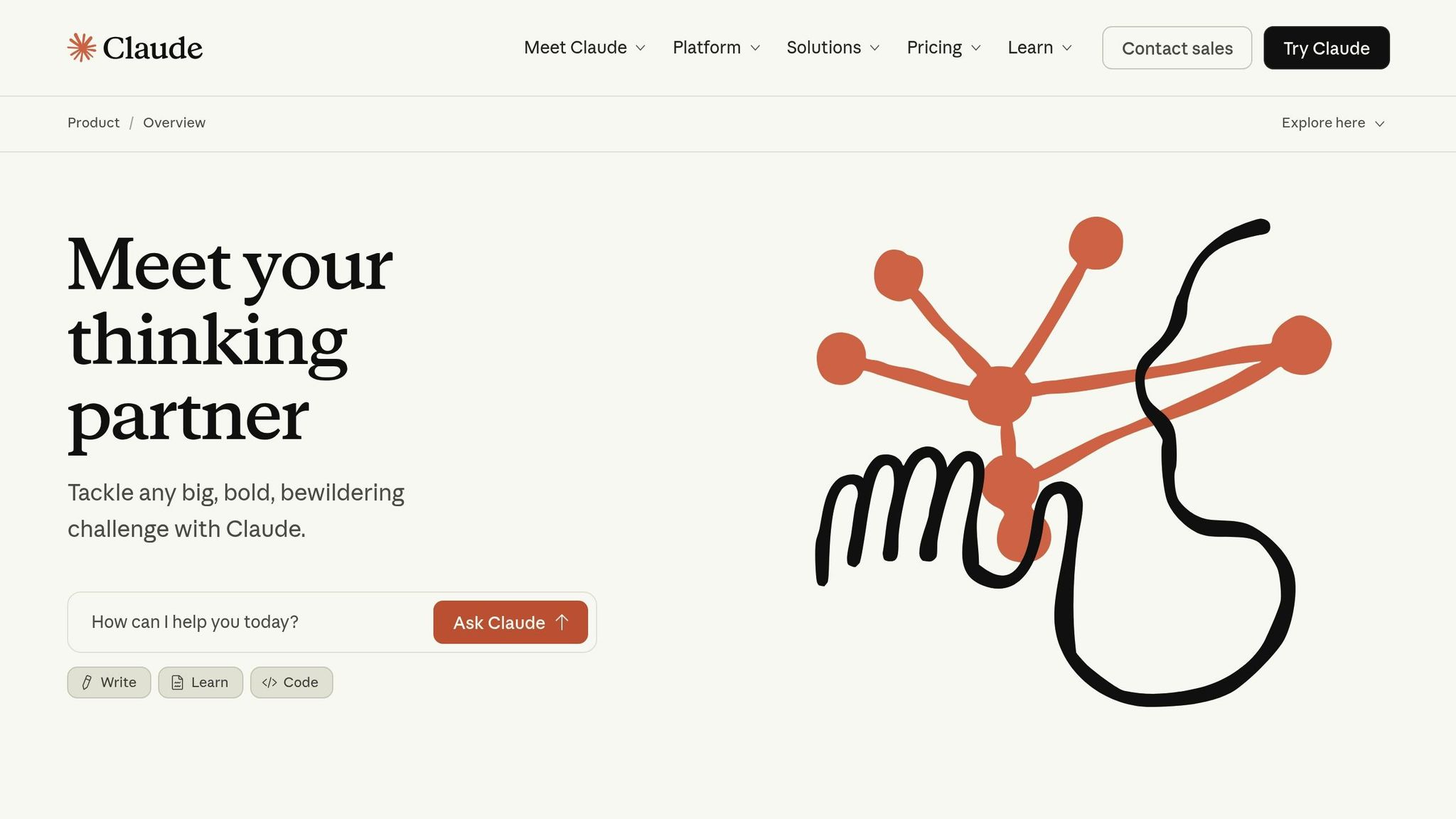
Claude, developed by Anthropic, stands out as a dependable choice for businesses seeking AI-powered language solutions. With a strong focus on safety, precision, and ethical AI use, Claude is particularly suited for organizations that value responsible AI integration. The model is designed to tackle complex language tasks while delivering consistent and reliable outputs that meet business standards and compliance needs.
Claude shines in tasks that demand nuanced language comprehension and generation. Its training emphasizes careful reasoning and contextual understanding, minimizing the risk of producing inaccurate or inappropriate content. This makes it an excellent fit for customer-facing roles and sensitive business communications. Additionally, Claude handles extended conversations with ease, maintaining context and coherence over time. This capability makes it ideal for applications like in-depth customer support, detailed content creation, and multi-step analytical processes that require sustained focus.
Security is a cornerstone of Claude's design. The model includes advanced safeguards to help businesses uphold ethical AI practices while protecting sensitive data. Transparency and explainability are key features, enabling organizations to audit and understand AI-generated outputs with greater clarity. Claude's API allows seamless integration into existing workflows, supporting a range of uses from automated customer service to data analysis and content generation. Its reliable performance and adherence to ethical standards make it a trusted option for companies aiming to align AI-driven processes with corporate values and regulatory obligations.
LLaMA, short for Large Language Model Meta AI, is Meta's research-focused language model series. It stands out for its emphasis on efficiency and adaptability, making it a practical choice for a wide range of AI applications. Initially launched as an open research initiative, LLaMA now provides the tools needed to tackle various AI challenges with a streamlined and performance-driven approach.
LLaMA is built to handle tasks like text generation, long-context retention, content creation, and analytical reporting. Thanks to its compact architecture, it achieves impressive processing speeds while requiring fewer computational resources than larger models. This efficiency allows it to deliver accurate results without compromising performance.
One of LLaMA's standout features is its cost-effective design. By minimizing computational demands, it keeps operational costs lower. Organizations can deploy it on-premises, in private clouds, or through hybrid setups, granting them control over their infrastructure and reducing reliance on external APIs. Additionally, its research-focused licensing model makes customization more affordable by minimizing licensing fees.
LLaMA's modular and flexible design ensures seamless integration into various business systems. Whether running on a single GPU or scaling across distributed systems, it adapts to different operational needs. Its architecture also supports fine-tuning, allowing businesses to tailor the model for specialized applications with ease.
Gemini, developed by Google, is a multimodal AI model tailored to handle text, image, code, and audio workflows. Its versatility makes it suitable for a variety of business applications, offering solutions across multiple content types.
At this stage, detailed information about Gemini's performance, security features, pricing structure, and integration capabilities is still scarce. Businesses seeking precise updates should refer to official communications from Google.
While Gemini shows potential, it remains an emerging option that warrants comparison with more established alternatives in the market.
This section highlights the main advantages and drawbacks of each AI model, summarizing their unique strengths and trade-offs. These insights help organizations match AI tools to their specific goals and challenges.
Prompts.ai stands out for its unified platform that integrates multiple AI tools, offering up to 98% cost savings. Features like real-time FinOps controls and enterprise-level governance make it an excellent choice for managing budgets and ensuring compliance.
GPT-5 shines in advanced conversational abilities, creative problem-solving, strategic planning, and customer interactions. Its widespread adoption and strong community support add to its appeal. However, it comes with higher operational costs and a reliance on a single provider for key functions.
Claude prioritizes safety and compliance, making it ideal for industries with strict regulatory requirements. Its ethical design ensures reliable outputs, though its conservative approach may limit creative applications.
LLaMA is an open-source option offering unmatched flexibility for data control and customization. That said, this level of control requires significant technical expertise and can introduce complexity.
Gemini, backed by Google, supports multimodal inputs, but limited information on its performance and pricing makes it harder to fully assess its value for now.
The table below provides a quick comparison of the benefits and limitations of each model:
| Model | Key Strengths | Primary Limitations |
|---|---|---|
| Prompts.ai | Unified platform, 98% cost savings, enterprise governance | - |
| GPT-5 | Advanced reasoning, creative capabilities, broad adoption | Higher costs, single-provider dependency |
| Claude | Safety-focused, ethical outputs, compliance-friendly | Conservative output, less creative flexibility |
| LLaMA | Open-source, customizable, data control | High technical complexity, requires expertise |
| Gemini | Multimodal inputs, Google-backed | Limited performance data, unclear pricing |
Selecting the right model often depends on specific organizational priorities. For businesses seeking cost efficiency and centralized management, Prompts.ai is a strong contender. Those requiring cutting-edge performance lean toward GPT-5, while compliance-driven industries prefer Claude. Teams with advanced technical skills may benefit most from LLaMA. For Gemini, further details on pricing and performance will be crucial for evaluation.
Cost management plays a significant role in these decisions. Traditional subscription models can quickly become expensive as usage grows. In contrast, Prompts.ai offers a pay-as-you-go TOKN credit system that aligns costs with actual usage, making it a flexible option for organizations with fluctuating AI needs.
Integration complexity also varies. Models like GPT-5 and Claude typically offer simple API setups, but managing multiple models independently can increase operational overhead. On the other hand, LLaMA provides extensive customization but demands greater technical investment. As for Gemini, its integration process remains unclear, so keeping an eye on updates is advisable as more information becomes available.
Selecting the right AI model depends on understanding your workflow needs, regulatory requirements, and budget limitations. These factors will help steer you toward the most suitable option for your unique business goals.
Among the available choices, Prompts.ai stands out as a cost-effective, all-in-one solution. Its unified platform simplifies AI management by consolidating tools and offering up to 98% cost savings through the pay-as-you-go TOKN system. For businesses prioritizing centralized control and governance, this platform ensures compliance while keeping AI spending in check.
For those seeking cutting-edge performance, GPT-5 delivers exceptional capabilities in complex problem-solving and strategic planning. However, its premium pricing and reliance on a single provider may not align with every budget or operational need.
Claude excels in industries requiring strict compliance and safety measures, such as financial services, healthcare, and legal sectors. Its ethical focus makes it particularly well-suited for sensitive business communications, though it may lack the creative flexibility of other models.
LLaMA offers open-source flexibility for organizations with advanced technical expertise. Its customizable nature and full data control are attractive, but the trade-off is increased complexity and resource requirements.
While specialized models bring unique benefits, not all are ready to meet immediate business needs. For instance, Gemini's multimodal features show potential, but unclear pricing and performance metrics make it challenging to recommend at this stage. Keeping an eye on its progress as Google provides more details is a wise move.
For startups and small businesses, Prompts.ai provides an affordable and streamlined approach, while larger enterprises with dedicated AI teams may find value in exploring multiple specialized models. Ultimately, the success of AI integration depends on how well the chosen model aligns with your workflows and supports your long-term objectives.
Prompts.ai places a strong emphasis on data security and regulatory compliance, employing advanced encryption methods, secure storage solutions, and strict access controls. These safeguards are designed to keep sensitive business data protected at all times.
The platform also aligns with key industry standards and legal requirements like GDPR and CCPA, ensuring compliance across different industries. To maintain a secure environment, Prompts.ai performs regular security audits and updates, minimizing risks and providing a dependable system for managing and integrating multiple AI models.
When choosing between a standalone AI model and a comprehensive platform like Prompts.ai, businesses must consider their unique objectives and operational needs. Prompts.ai brings together over 35 AI language models, allowing users to compare them side-by-side. This flexibility helps refine workflows, ensuring improved performance and precision.
The platform also includes robust tools for managing AI operations effectively. With real-time insights into usage, costs, and ROI, businesses can maintain transparency and control expenses. This approach enables them to harness AI's full potential for tasks such as content creation, customer support, and data analysis, all while driving efficient and measurable outcomes.
Prompts.ai's pay-as-you-go TOKN system is designed to help you manage costs effectively by charging only for what you use - no unnecessary recurring fees. With this approach, you can buy TOKN credits whenever needed and distribute them across various models to suit your specific needs.
This setup empowers businesses to stay in control of their budgets while still enjoying access to advanced AI tools, making it a smart choice for cost-conscious organizations.


